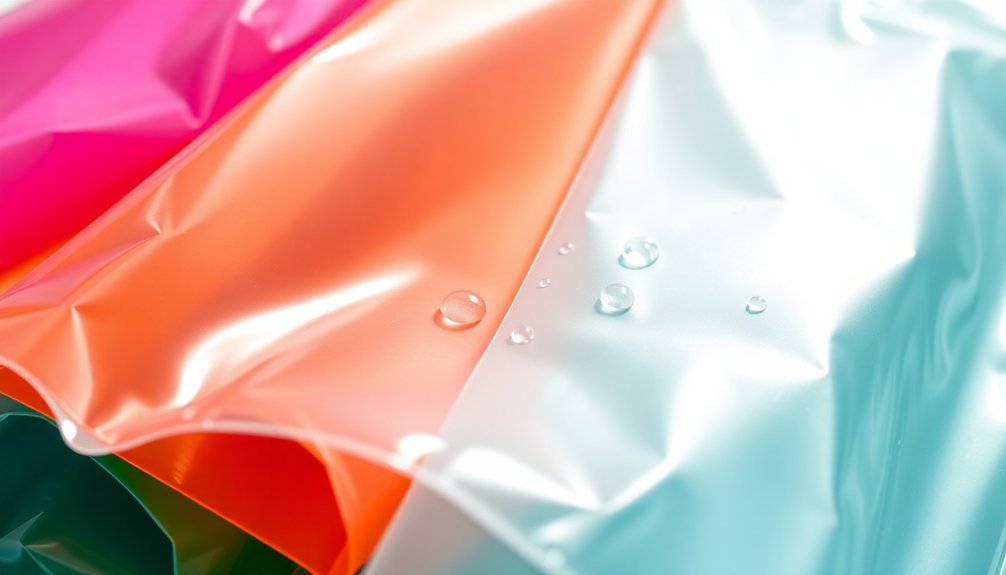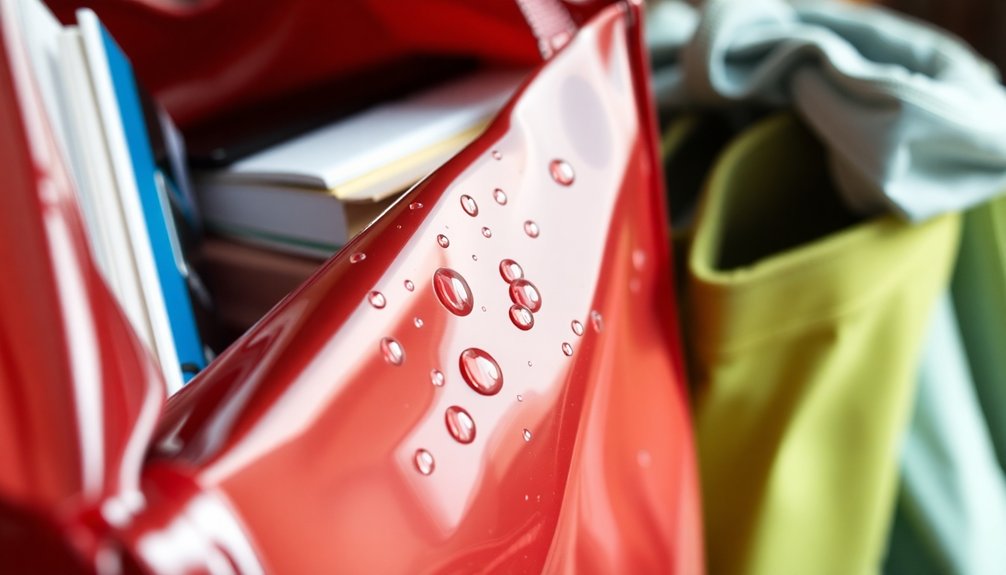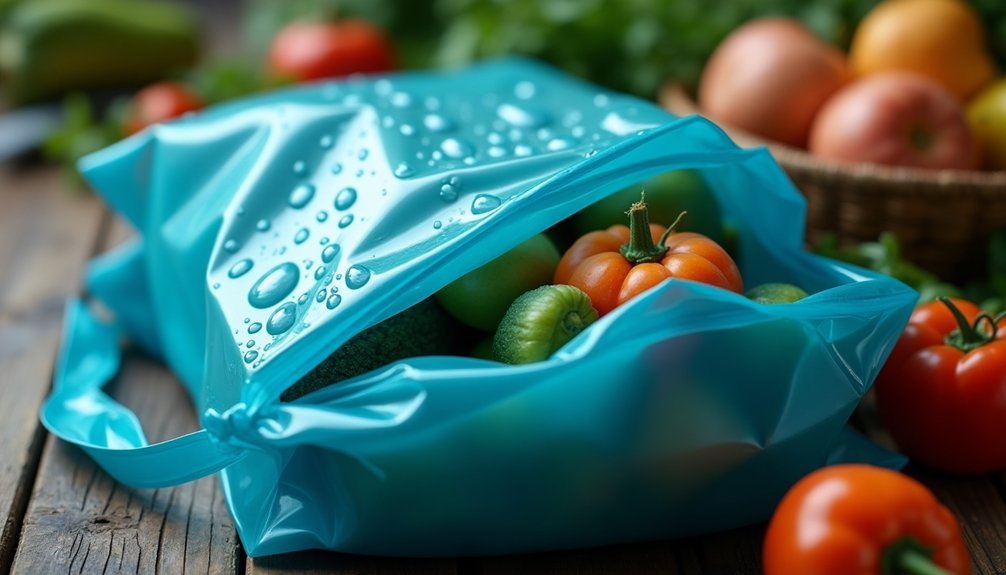Yes, polypropylene bags are indeed waterproof, providing excellent protection against moisture for your contents. The tightly packed molecules in these bags create a strong structure that prevents water from penetrating. If you're using woven polypropylene, you'll find that tightly woven types offer superior resistance. Laminated finishes can enhance waterproofing further, though they might reduce breathability. It's important to regularly inspect your bags, as any damage can compromise their waterproof capabilities. To learn more about choosing the right type for your needs and maximizing their protective features, keep exploring your options.
Key Takeaways
- Waterproof polypropylene bags completely prevent water penetration, making them effective for protecting contents from moisture damage.
- Woven polypropylene offers enhanced water resistance compared to non-woven options, with tightly woven varieties providing superior protection.
- Laminated finishes on bags enhance waterproofing but may reduce breathability, making them ideal for moisture-sensitive items.
- Regular inspections are essential, as bag damage can compromise waterproofing capabilities and allow moisture to enter.
- Choosing the right bag design, such as leakproof bulk bags, further improves moisture protection during transit.
Understanding Polypropylene Properties
Understanding the properties of polypropylene reveals why it's such a popular choice for waterproof bags. The tightly packed molecules in polypropylene create a strong structure that effectively prevents water penetration, allowing moisture to bead up on the surface instead. This waterproof characteristic is key when you want to protect your dry goods from unexpected spills or rain.
When it comes to woven polypropylene, the level of water resistance can vary. Tightly woven fabrics provide superior waterproofing compared to loosely woven types. If you're looking for enhanced protection, consider bags with laminated finishes. These finishes bolster the waterproof capabilities of polypropylene, though they might reduce breathability.
To check how well your polypropylene bags resist moisture, you can easily perform a simple water bead test. Just sprinkle a few drops of water on the fabric and observe if they bead up or soak in.
Additionally, polypropylene boasts excellent chemical resistance, making it a reliable choice for various applications beyond just waterproof needs. Polypropylene also has a high melting point, making it suitable for high-heat applications, which is another reason it's commonly used in waterproof bags. By understanding these properties, you can make informed decisions when selecting bags to keep your belongings safe from moisture.
Waterproof vs. Water-Resistant
When choosing polypropylene bags, it's important to know the difference between waterproof and water-resistant materials. Waterproof polypropylene, like laminated versions, prevents water from penetrating, ensuring your contents remain completely dry.
In contrast, water-resistant materials offer some protection against light rain or splashes but may allow moisture to pass through.
Polypropylene bags can vary in their waterproofing effectiveness. Woven types typically provide enhanced resistance compared to non-woven versions, which might allow some moisture to seep in. If you're selecting a bag for items sensitive to moisture, understanding this distinction is crucial.
You can perform a simple water bead test to check if a polypropylene fabric is truly waterproof. If water beads and rolls off the surface, it indicates a properly treated fabric.
However, remember that the effectiveness of waterproofing can be compromised if the bag is damaged. Openings or gaps can easily allow water to breach the material, so inspect your bags regularly.
Additionally, polypropylene's thermoplastic properties make it a versatile and durable material for various applications, including waterproof bags.
Types of Polypropylene Bags

Polypropylene bags come in a variety of types, each tailored for specific uses and levels of moisture protection.
If you're looking for bulk storage solutions, FIBC bags are a fantastic choice. These large, flexible containers can hold up to 2,000 pounds, making them ideal for transporting dry goods.
For retail packaging, BOPP bags are popular due to their glossy finish and enhanced graphics, often laminated for added waterproofing.
If you need bags that stand upright, gusseted bags are the way to go. Their additional side panels provide stability, making them great for packaging items that need to remain upright.
On the other hand, lined bags feature an inner layer of plastic or foil, offering extra moisture protection for sensitive materials.
Polypropylene bags are also made from a type of plastic that can be recycled globally, reducing the environmental impact of their production and disposal.
Benefits of Waterproofing
Waterproofing offers significant advantages for those using polypropylene bags, especially in protecting valuable goods from moisture damage. With the waterproof qualities inherent in these bags, you can ensure that your items remain safe during transit, even under unpredictable shipping conditions.
The laminated finish enhances their water resistance, making it nearly impossible for spills or contaminants to compromise your product's integrity.
Using waterproof polypropylene bags is crucial for moisture-sensitive products like pet food and agricultural materials, as plastic waste contributes to long-term pollution and emphasizes the importance of sustainable packaging solutions. You'll maintain their quality throughout handling and storage, which is essential for your business's reputation.
By minimizing the risk of financial loss due to damaged goods from moisture exposure, you're investing smartly in your supply chain.
Additionally, the leakproof design of bulk polypropylene bags further boosts their waterproof capabilities. This reliable protection against moisture ingress means you can focus on other aspects of your operations without worrying about your products.
In short, waterproofing in polypropylene bags not only protects your contents but also enhances your overall efficiency, ensuring that your goods arrive in perfect condition, ready for use or sale.
Choosing the Right Bag

Selecting the right bag is essential for ensuring your products stay protected during transit. When considering waterproofing, focus on polypropylene bags with laminated finishes, as they enhance moisture resistance. It's essential to understand your products' sensitivity to moisture; this knowledge will guide your waterproofing choices. Considering polypropylene items can be recycled and reused, opt for bags made from sustainable materials to minimize waste.
Opt for woven polypropylene bags when you need higher tensile strength and durability, as they outperform non-woven options in waterproof qualities. Additionally, consider the size and design of the bags. Bulk bags with leakproof designs can prevent spills and contamination, keeping your contents dry.
To help you visualize your options, here's a quick comparison:
| Bag Type | Key Features |
|---|---|
| Laminated Polypropylene | Enhanced moisture resistance |
| Woven Polypropylene | High tensile strength, durable |
| Non-Woven Polypropylene | Lower waterproofing capabilities |
| Bulk Bags | Leakproof design, ideal for transit |
Consulting with packaging experts can also aid in identifying the most suitable bag type and size for your specific packaging needs. Making informed choices will maximize your product safety and efficiency during transportation.
Frequently Asked Questions
Is Polypropylene Moisture Resistant?
Yes, polypropylene is moisture resistant due to its molecular structure. However, the level of resistance can vary based on whether the material is woven or non-woven, so you should choose accordingly for your needs.
What Happens to Polypropylene When It Gets Wet?
When polypropylene gets wet, it resists water due to its tightly packed structure, causing moisture to bead up. However, if damaged, its waterproof properties can diminish, allowing water to seep through openings.
Are Polypropylene Bags Waterproof?
Yes, polypropylene bags are generally waterproof. Their tightly packed molecules resist water penetration, but keep in mind that their effectiveness can vary. Check for any damage or gaps that might compromise their waterproof characteristics.
What Is the Difference Between Polyethylene and Polypropylene Bags?
Polyethylene bags are flexible and moisture-resistant, ideal for lightweight items. In contrast, polypropylene bags are stiffer, more durable, and resistant to chemicals, making them better for heavier or more delicate contents that need extra protection.

